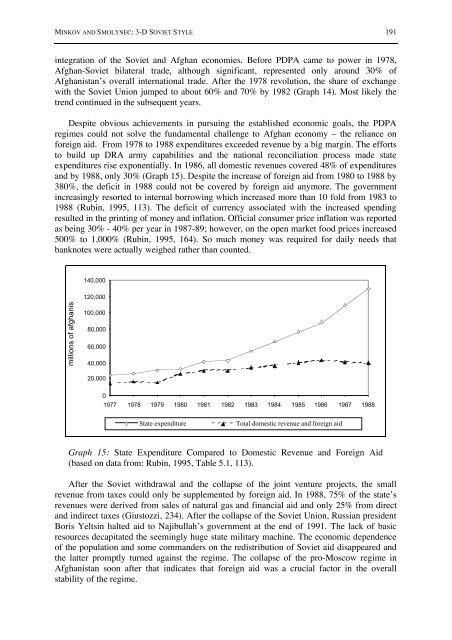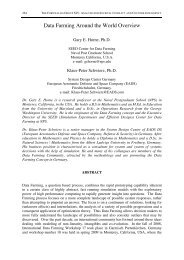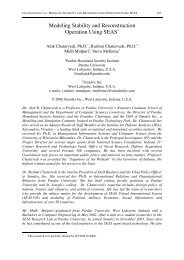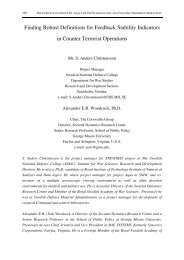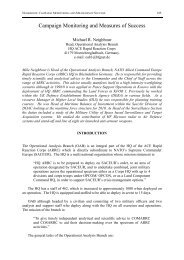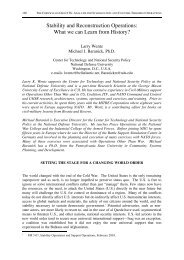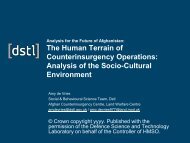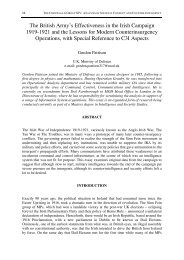MINKOV AND SMOLYNEC: 3-D SOVIET STYLE 191<strong>in</strong>tegration of <strong>the</strong> <strong>Soviet</strong> and Afghan economies. Before PDPA came to power <strong>in</strong> 1978,Afghan-<strong>Soviet</strong> bilateral trade, although significant, represented only around 30% ofAfghanistan’s overall <strong>in</strong>ternational trade. After <strong>the</strong> 1978 revolution, <strong>the</strong> share of exchangewith <strong>the</strong> <strong>Soviet</strong> Union jumped to about 60% and 70% by 1982 (Graph 14). Most likely <strong>the</strong>trend cont<strong>in</strong>ued <strong>in</strong> <strong>the</strong> subsequent years.Despite obvious achievements <strong>in</strong> pursu<strong>in</strong>g <strong>the</strong> established economic goals, <strong>the</strong> PDPAregimes could not solve <strong>the</strong> fundamental challenge to Afghan economy – <strong>the</strong> reliance onforeign aid. From 1978 to 1988 expenditures exceeded revenue by a big marg<strong>in</strong>. The effortsto build up DRA army capabilities and <strong>the</strong> national reconciliation process made stateexpenditures rise exponentially. In 1986, all domestic revenues covered 48% of expendituresand by 1988, only 30% (Graph 15). Despite <strong>the</strong> <strong>in</strong>crease of foreign aid <strong>from</strong> 1980 to 1988 by380%, <strong>the</strong> deficit <strong>in</strong> 1988 could not be covered by foreign aid anymore. The government<strong>in</strong>creas<strong>in</strong>gly resorted to <strong>in</strong>ternal borrow<strong>in</strong>g which <strong>in</strong>creased more than 10 fold <strong>from</strong> 1983 to1988 (Rub<strong>in</strong>, 1995, 113). The deficit of currency associated with <strong>the</strong> <strong>in</strong>creased spend<strong>in</strong>gresulted <strong>in</strong> <strong>the</strong> pr<strong>in</strong>t<strong>in</strong>g of money and <strong>in</strong>flation. Official consumer price <strong>in</strong>flation was reportedas be<strong>in</strong>g 30% - 40% per year <strong>in</strong> 1987-89; however, on <strong>the</strong> open market food prices <strong>in</strong>creased500% to 1,000% (Rub<strong>in</strong>, 1995, 164). So much money was required for daily needs thatbanknotes were actually weighed ra<strong>the</strong>r than counted.140,000120,000millions of afghanismillions of afghanis100,00080,00060,00040,00020,00001977 1978 1979 1980 1981 1982 1983 1984 1985 1986 1987 1988State expenditureTotal domestic revenue and foreign aidGraph 15: State Expenditure Compared to Domestic Revenue and Foreign Aid(based on data <strong>from</strong>: Rub<strong>in</strong>, 1995, Table 5.1, 113).After <strong>the</strong> <strong>Soviet</strong> withdrawal and <strong>the</strong> collapse of <strong>the</strong> jo<strong>in</strong>t venture projects, <strong>the</strong> smallrevenue <strong>from</strong> taxes could only be supplemented by foreign aid. In 1988, 75% of <strong>the</strong> state’srevenues were derived <strong>from</strong> sales of natural gas and f<strong>in</strong>ancial aid and only 25% <strong>from</strong> directand <strong>in</strong>direct taxes (Giustozzi, 234). After <strong>the</strong> collapse of <strong>the</strong> <strong>Soviet</strong> Union, Russian presidentBoris Yelts<strong>in</strong> halted aid to Najibullah’s government at <strong>the</strong> end of 1991. The lack of basicresources decapitated <strong>the</strong> seem<strong>in</strong>gly huge state military mach<strong>in</strong>e. The economic dependenceof <strong>the</strong> population and some commanders on <strong>the</strong> redistribution of <strong>Soviet</strong> aid disappeared and<strong>the</strong> latter promptly turned aga<strong>in</strong>st <strong>the</strong> regime. The collapse of <strong>the</strong> pro-Moscow regime <strong>in</strong>Afghanistan soon after that <strong>in</strong>dicates that foreign aid was a crucial factor <strong>in</strong> <strong>the</strong> overallstability of <strong>the</strong> regime.
192 THE CORNWALLIS GROUP XII: ANALYSIS FOR MULTI-AGENCY SUPPORTDIPLOMACY: DOMESTIC RELATIONSIn addition to sovietization, <strong>Soviet</strong> social strategy also <strong>in</strong>cluded work<strong>in</strong>g with <strong>the</strong> traditionalleaders <strong>in</strong> <strong>the</strong> countryside, <strong>from</strong> whose ranks mujahid<strong>in</strong> commanders usually came, play<strong>in</strong>goff <strong>the</strong> traditional tribal divisions to <strong>the</strong>ir advantage and even co-opt<strong>in</strong>g <strong>the</strong> religious scholars– <strong>the</strong> ulama. This approach was known as <strong>the</strong> pacification process or pacification policy.What is important to note here, is that <strong>the</strong> pacification process re<strong>in</strong>forced <strong>the</strong> traditionalsociety and thus was counterproductive for <strong>the</strong> sovietization process. Pacification was<strong>Soviet</strong>s’ short-term strategy <strong>in</strong> deal<strong>in</strong>g with <strong>the</strong> challenges posed by Afghan diversity. Tobridge <strong>the</strong> two approaches, an attempt was made to reconcile <strong>the</strong> traditional social structureand <strong>in</strong>stitutions with <strong>the</strong> new party-state structure and <strong>in</strong>stitutions.As early as 1980, PDPA’s Central Committee agreed on a policy of peace andcooperation with <strong>the</strong> Afghan tribes. Tribal traditions would be respected and economic helppromised. The Loya Jirgah (<strong>the</strong> Grand Assembly of tribal chiefs, notables and religiousleaders) was established as a state <strong>in</strong>stitution, convened by <strong>the</strong> Revolutionary Council(Giustozzi, 130). The Loya Jirgah was designated as <strong>the</strong> ultimate organ of power <strong>in</strong> <strong>the</strong> state(Nyrop and Seek<strong>in</strong>s, 269). As state <strong>in</strong>stitutions, as well as state’s abilities to provideeconomic help and to retaliate were gradually rebuilt, many tribal chiefs decided to accept<strong>the</strong> state’s authority. The M<strong>in</strong>istry of Tribal and Frontier Affairs played important role <strong>in</strong><strong>in</strong>teraction with <strong>the</strong> tribes and <strong>in</strong> 1983, its m<strong>in</strong>ister claimed that he had ensured <strong>the</strong> support of5,000 tribal notables (Giustozzi, 133).The difficulty of PDPA to establish party cells and state adm<strong>in</strong>istration structures atvillage, subdistrict and district levels left <strong>the</strong> local Jirgahs (a traditional Afghan council ofelders) as <strong>the</strong> only alternative for <strong>the</strong> state to adm<strong>in</strong>ister <strong>the</strong> prov<strong>in</strong>ces below governmentlevel. Thus, an effort was made to ensure that members of <strong>the</strong> Jirgah were sympa<strong>the</strong>tic to <strong>the</strong>government. The PDPA had <strong>the</strong> right to nom<strong>in</strong>ated candidates for <strong>the</strong> local Jirgah while <strong>the</strong>population would <strong>the</strong>n elect <strong>the</strong>m through a vote. The process of form<strong>in</strong>g <strong>the</strong> local Jirgahs,culm<strong>in</strong>ated with <strong>the</strong> convention of two Loya Jirgahs - April and September 1985. Almost5,500 tribal notables, religious leaders and militia commanders participated <strong>in</strong> <strong>the</strong>m. In manycases, however, <strong>the</strong> elders were bribed to be present (Giustozzi, 137-138).In addition to traditional and tribal structures, <strong>Soviet</strong> strategy <strong>in</strong>cluded <strong>in</strong>tegrat<strong>in</strong>g <strong>the</strong>religious figures, who <strong>in</strong> many <strong>in</strong>stances were as much or even more <strong>in</strong>fluential than <strong>the</strong>tribal notables. A M<strong>in</strong>istry of Religious Affairs and Endowments was established while oneof <strong>the</strong> NFF member organizations was <strong>the</strong> Council of Ulema and Mullah (Nyrop andSeek<strong>in</strong>s, 270, Giustozzi, 59). The government sponsored numerous conferences of religiousleaders, reconstructed mosques and distributed grants to pilgrims to Mecca (Nyrop andSeek<strong>in</strong>s, 270). The ulama, supportive of <strong>the</strong> government, were given special allowances andcoupons for food and commodities. In 1987, 16,000 Islamic leaders received such benefitsand <strong>the</strong>ir number <strong>in</strong>creased to 20,000 one year later (Giustozzi, 62). The vast majority of <strong>the</strong>religious figures, however, rema<strong>in</strong>ed outside <strong>the</strong> state religious system. The religiousauthority <strong>in</strong> Afghanistan was more elusive and religious hierarchy much less developed than<strong>the</strong> one <strong>in</strong> <strong>Soviet</strong> Central Asia, which did not allow for a similar approach where <strong>the</strong>foster<strong>in</strong>g of a “red” clergy elite would automatically lead to ensur<strong>in</strong>g <strong>the</strong> loyalty of <strong>the</strong> flock(Nyrop and Seek<strong>in</strong>s, 271).


